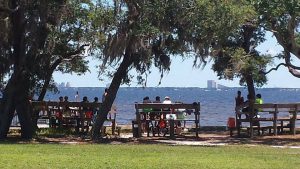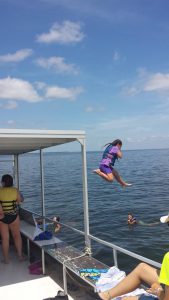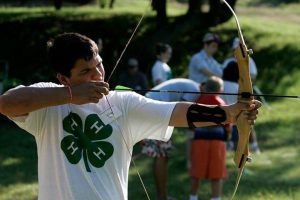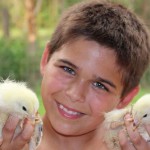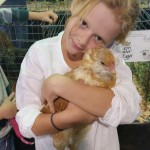Life Lessons Learned at Camp
Its official- summer camp season has started, which inspired me to ponder my own childhood camp experiences and how different they were from what 4-H offers. My first youth camping experience was not fun, but it also was not through a positive youth development program (gasp!). That’s right- although I have been a 4-H professional for more than 17 years, I did not grow up in the 4-H program. In fact, I had never even heard of 4-H until I attended graduate school at a USDA land-grant University.
One of the explanations for my “4-H vacuum” can be attributed to the fact that I was born into a military family. Much of my childhood was spent overseas and at that time, 4-H was not widely offered on military bases the way it is now. Today University of Florida 4-H faculty serve as liaisons to 4-H clubs on military bases in England, Germany, Italy and Cuba. UF even offers a week of camp specifically for military youth called Camp Corral. Because of my limited 4-H experience, it was not until I had a couple of summers “under my belt” as a 4-H faculty member that I really understood the value of our camping program and why it is one of the most significant ways we impact youth.
I could spout out all of the data that supports how youth benefit from camp, but I am going to lead with the “why.” It really hit home for me my second year as a 4-H agent when I found one of my 4-Hers sobbing on the last day of camp. I asked her what was wrong and she shared:
“I am crying because I don’t want to leave. This is my second year at camp and I look forward to it all year because it is the only place I feel like I belong. Camp is the only place I can be myself. At school I am bullied and made fun of, but here I am accepted for who I am and I am included in everything. This is where I feel ‘normal’ and where I feel like I matter. I wish it could be like this all year long.”
From that point forward, I never dreaded all the work that went into making camp happen. I realized the true impact of what we do, and I have heard countless youth express similar sentiments over the years. It gives youth a break from the cliques or labels at school. They can explore new interests and cultivate an appreciation of the outdoors. They learn how to be responsible for their belongings; how to get along with others in cramped cabin spaces; they observe adults and teens working together and respecting people who might look or act differently from themselves.
When I wear my 4-H shirt , I am almost always stopped by strangers telling me that they were in 4-H and that 4-H camp is where they met their best friend, spouse, where they learned to swim, or how they learned to lead. 4-H camp matters. 4-H camp is different and 4-H camp works because faculty, staff and volunteers are intentional about incorporating the essential elements of positive youth development into every aspect of camp. We painstakingly plan to create an inclusive environment where it is safe to try new things like tying a clinch knot to rig your fishing pole, performing a skit on stage or kayaking with dolphins. We purposefully plan to build a sense of community at camp. In a very measured way we develop leaders and youth adult partnerships. 4-H camp is in and of itself a teen-adult youth partnership. 4-H teens are trained as counselors and have quite a bit of input on how the camp week is structured. In addition, these teens demonstrate their 4-H skills by teaching classes at camp, leading activities, and mentoring younger youth. These elements are not present at most other camps- even the really expensive or exclusive ones. However, 4-H camps are reasonably priced and open to all youth between the ages of 8 and 18 (as of Sept. 1st).
I have had the privilege of witnessing first-hand how camp can ignite a spark in a young person to set them up for success later in life. I saw my first-time campers grow to become counselors in training. After a couple more years I watched them blossom into leaders- not just at camp, but in our community back home and at their schools. I watched them mentor other youth and influence their peers in positive ways. I had the honor of watching them win scholarships and internships based on their service and leadership through 4-H. I saw them return to camp as 4-H alumni, summer staff and volunteers. Now, many of them are successful business owners, teachers, engineers and civic leaders. Soon, my “campers” will have children of their own old enough to attend 4-H camp. As I reflect, I can’t help but hear the faint tune of “Circle of Life” playing in my head. . .
But seriously, I wish that I had had the opportunity to experience 4-H camp as a young person. My first (non-4-H) camping experience had none of these elements of positive youth development. I remember being incredibly grateful when the experience was over and thankful to have survived it (it involved an earthquake while traveling by train through the mountains of Italy to reach our campsite- a compelling story for a different type of blog-post). The 4-H camp formula is not only fun (and safe) for kids, it has a well-documented history of teaching them lifelong lessons to help them be productive citizens and members of the workforce. As a Gen X mom myself, I have to ask “What parent wouldn’t want that for their child?” To find out more about the Florida 4-H Camping Program, contact your local UF IFAS County Extension Office, or visit http://florida4h.org.
2016 Florida 4-H Camp Schedule– it’s not too late to sign up, but camp slots are going quickly!

